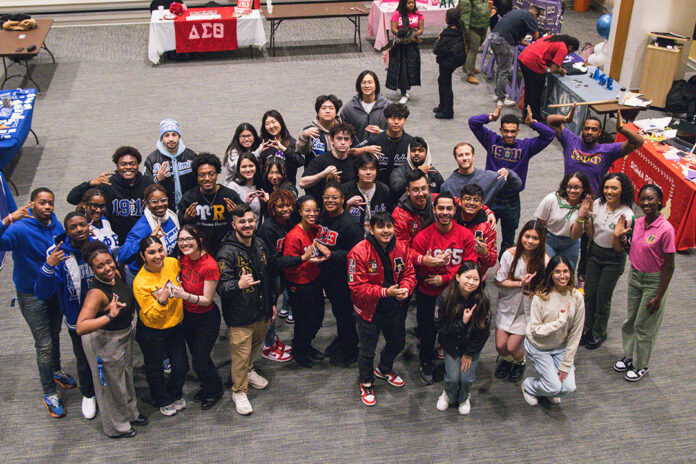“We have our own brand of Greek Life here at RIT that is very focused on the service side of things and very different than the Animal House movie image of what some people think a fraternity is,” said Matt Diss, a third-year cybersecurity major from Plum, Pa. “We’re more wholesome. We’re very much a close-knit community where you can build up your network and make lifelong connections that will last long after you graduate.”
Diss, vice president of RIT Sigma Chi fraternity and Greek Life representative in Student Government, said he didn’t have any intentions of joining a fraternity until he saw some of the events organized on campus. He joined during his freshman year after attending a recruitment meeting.
“The brotherhood and philanthropy is what attracted me,” he said. “That group of 30 or 50 guys or girls you know who are always there and you can always count on is great. I’ve gone on spring break every year with brothers from my fraternity.”
RIT’s oldest chapter, Phi Sigma Kappa, was founded in 1960. Six of the 28 fraternities or sororities have common housing behind Global Village. Each chapter has its own vetting process for how it accepts members. Some are co-run by students from other area colleges, such as the University of Rochester. Members pay dues and must maintain at least a 2.5 GPA.
Most have weekly meetings, fundraising or volunteering activities, and social events. Throughout the year, it’s not unusual to see members host carnival games, pole sits, or even take a sledgehammer to an old car to raise money for charity.
In some cases, their national chapter decides the local chapter’s philanthropy.
“We’ve donated around $200,000 in the past 10 years to the Huntsman Cancer Institute,” Diss said.
John Serafim arrived in Washington, D.C. last summer after a 67-day, 4,300-mile bike ride from Seattle for the Journey of Hope. He raised nearly $10,000 in pledges for the charity which helps individuals with disabilities. More than 30 RIT students in Pi Kappa Phi have participated in the summer fundraiser in the past 13 years.
For the past 13 years, members of RIT’s Pi Kappa Phi chapter, more than 30 in total, have ridden bicycles across the country each summer for the Journey of Hope, which helps individuals with disabilities. John Serafim, a fourth-year mechanical engineering major from Radnor, Pa., was one of three RIT students from the fraternity who participated last summer. He rode 4,300 miles from Seattle to Washington, D.C., in 67 days, raising nearly $10,000 for the charity.
“It was incredible. There isn’t a more fulfilling experience that I could possibly think of,” Serafim said. “Doing something super physically challenging every day and having friendship visits along the way with people with disabilities was so emotionally rewarding. Every day I was living with a sense of purpose.”
Serafim knew he wanted to join a college fraternity, and said that doing so “has definitely been one of the best decisions I have made at RIT. I can’t speak highly enough of Greek Life at RIT. It enabled me to have this incredible adventure over the summer and made me part of a smaller community at such a big school. I can walk across campus and see people I know.”
Phi Delta Theta members raise money for Live Like Lou Foundation, supporting ALS families and research, by lining up quarters on the Quarter Mile. And each autumn, the Zeta Tau Alpha sorority and Phi Kappa Psi fraternity raise around $10,000 for the Hillside Family of Agencies at their popular Mud Tug.
Some organizations focus on members who support specific cultures, such as Latino America Unida, Lambda Alpha Upsilon Fraternity, which is a Latino-oriented, but not exclusive, fraternity.
“Something that makes us special is our emphasis on academics and leadership,” said Joseph Bean, a third-year computational mathematics major from Houston, Texas. “One of the goals we live by is to support each other personally and academically, and we always try to help each other the best we can in our weekly study hours. Our emphasis on leadership can be showcased around this campus by seeing Hermanos (brothers) taking on key roles, such as being presidents of the Multicultural Greek Council, Latin American Student Association, Alma De Mexico, and a student event manager for RIT’s College Activity Board.”
Diss said it’s not unusual for fraternity or sorority members to become leaders in other organizations. “Most people in Greek Life are involved in different aspects of campus, whether it be from new student orientation, to being a tour guide, to Student Government, to working an on-campus job, or being a leader in another club on campus,” he said. For example, Alex Shuron, the president of Sigma Chi, is also this year’s Student Government president. This year’s Student Government vice president is Sophia Pries, also the vice president of communications for her sorority, Zeta Tau Alpha.
Another benefit of joining a fraternity or sorority is the ability to network with alumni from RIT or their nationwide chapters. Serafim, for example, attributed getting his co-op in Boston from an RIT alumnus who was also a fraternity brother.
Each autumn, RIT’s Zeta Tau Alpha sorority and Phi Kappa Psi fraternity organize the popular Mug Tug. Hundreds of students participate, get dirty, and raise around $10,000 for the Hillside Family of Agencies.
“You not only have your chapter alumni network, but you have your greater alumni network across the globe,” Diss said. “I’ve reached out to people about job opportunities in their company just through LinkedIn because I’ve noticed they were Sigma Chi. In our chapter, it’s very common for our alumni to say, ‘Hey, my company’s hiring. Send me your resume if you’re interested in a position.’”
A recent Gallup poll conducted on behalf of the National Panhellenic Conference and the North American Interfraternity Conference showed that students who graduated in Greek Life reported better college experiences and felt better qualified for life after college and general well-being.
More than half also found employment within two months after graduation, compared to 36 percent of non-affiliated alums nationally.























